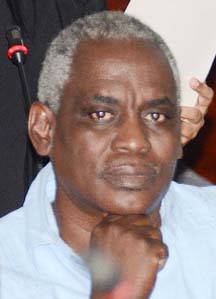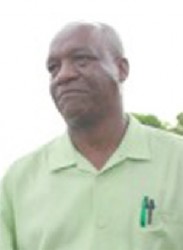Public Works Minister Robeson Benn yesterday said that he is not in favour of and will not be recommending the lowering of the 15% travel tax at the Cheddi Jagan Inter-national Airport, Timehri (CJIA).
Benn was at the time addressing reporters at a press briefing about the suggestion by APNU’s Joseph Harmon that government should drop the 15% travel tax to 10% to help cushion the impact of higher ticket prices on the Guyanese travelling public. According to Harmon, the travel tax goes to the government and it is cunning for them to link it to the operation of the airport.
“A reduction in the travel tax will only result in an increase of demand for ticket prices and an increase in ticket fares. A few days of persons getting a reduction will not solve the problem. What has to happen is we need to have a response from the supply side. It is just not feasible to lower it at this time,” Benn said yesterday. He added that the removal of taxes will affect facility maintenance and the continuation of operations on both CJIA and Ogle airports.

The money from the tax, he said, goes into a big “pot”—the Consolidated Fund—that deals with issues supporting travel in Guyana. He said that Guyana has one of the lowest travel tax rates in the Caribbean.
Benn argued that with the collapse of airlines, EZJet and Redjet and the cessation of scheduled flights from Delta Airlines, there has been a reduction in the availability of seats coming in and out of the country. He thanked Harmon for his interest in the matter but said that the price of the tickets relates to the availability of seats and they are currently in a situation where there are a limited number of seats available. “We are now at the peak season and the very high demand for seats and the demand under these circumstances outstrips the supply,” he said.
The introduction of Fly Jamaica, the minister said, will help to solve the problem since Guyana is being “soaked” by Caribbean Airlines (CAL), which is currently making the cost of travel noncompetitive especially on the Guyana to Trinidad leg. “In some cases a ticket to Trinidad costs US$400,” he pointed out. With Delta pulling out of the market earlier this year, Guyanese travelling to New York have been at the mercy of CAL, with ticket prices escalating to US$1400 in some cases.
According to Benn, there was a strong presentation by the Venezuelan president at the 34th CARICOM summit to have 50 or more midrange planes that would fly to regional capitals to alleviate the current travel situation. Benn also said that he has been informed that LIAT is looking to start flying from Ogle to the Caribbean in another two weeks to help mitigate the situation.
Chief Executive Officer of CJIA Ramesh Ghir concurred with Benn and said that issues with the departure tax have to do with the several components that make up ticket costs. “If you were to buy a ticket at the different aiports there are different taxes at different airports, there are charges relating to the use of the facility among other things,” he said.

Ghir added that the financial performance of the CJIA has improved. “In 2002, the airport would have collected $257 million and in 2012, the reported figure was $1.1 billion,” he said. (Tifaine Rutherford)




